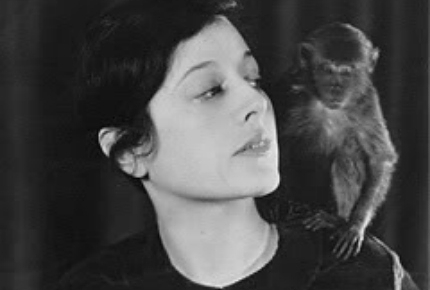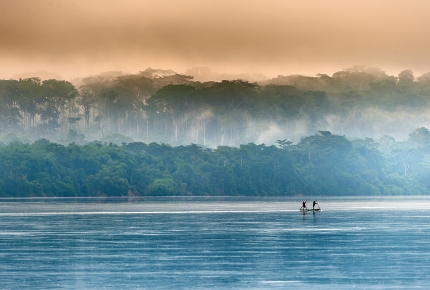How to: Hike solo across Africa like an absolute hero
Yearning for adventure but hampered by the fear of flying solo? Take inspiration from the tale of Emily Hahn, a revolver-carrying, cross-dressing receptionist who single-handedly crossed the Congo on foot. Ailsa Ross reports.
“Lots of people said they’d come,” explained the eccentric anthropologist Patrick Putnam when Emily arrived at the thick of Ituri Rainforest, “but you’re the only one who did.”
That’s because the jungle, then part of the Belgian-controlled Congo Free State, was over 9,500km (5,903 miles) from New York City, where the pair had first struck up a friendship.
It was an inevitable reunion: in 1929 struggling writer Emily was working as a temporary receptionist in New York, just months after the Wall Street Crash had plunged families into famine.
Young and impulsive, Emily yearned for adventure. At 24, she’d already completed a 3,862-km (2,400-mile) road trip across the States disguised as a man, but she’d always dreamed of Africa.
One biting December morning, Emily decided to take Patrick up on his offer to help out at his camp, deep in the un-gazetted tangle of the Ituri Rainforest.
So she quit her job, threw her belongings into a bag and set off to the Congo Free State.
Emily travelled on a third-class ticket aboard a French troopship. It was comfortable and clean with two meals a day, not including morning coffee in pyjamas. There were dances with sweet champagne, plus cigarettes and card games with Corsican troops.
"The more time I spend here,” Emily wrote in her journal, “the more indignant I am with all the English people who raised hell at my coming this way [in third class].”
Emily finally arrived at the Belgian Congo port of Boma where customs mistook her for a prostitute.
"I lost my courage, my temper, and my control,” Emily wrote in Congo Solo: Misadventures Two Degrees North. “Of course it was natural that they should think I was a whore; they're that way, and I didn't look at all prosperous - barelegged and ragged."
Emily, though, was more worried about her smuggled revolver being discovered. Leaving her cabin to try and bargain with customs, she tucked the gun into a belt under her dress and hid its bulk by wearing a big green jacket. To excuse her strange garb, she professed, "a violent chill," while the sweat dripped off her nose.
 Emily Hahn was an absolute badass
Emily Hahn was an absolute badassWikimedia Commons / Photobucket
From Boma, Emily made her way up the Congo River to Matidi, the furthest point ocean-going vessels could reach, before taking a train to Kinshasa. She made the last leg to the Ituri Rainforest by pirogue, a narrow canoe made from a single tree trunk.
"We came to the first rapids and aimed straight for the highest, most impassable part, a real waterfall,” she wrote, adding that the river then became “beautiful, oily-smooth for long stretches and rippled at the rapids.”
At the Ituri Rainforest, she met an irritable Patrick. After eight months of dealing with bouts of yaws, syphilis and leprosy, Emily decided to move on, taking inspiration from an Encyclopaedia Britannica article.
The piece was on Alexandrine Tinné, an intrepid Dutch traveller who was the first Western woman to attempt to cross the Sahara on foot in the 1860s.
Wishing to head west, Emily recruited porters from the local Ituri village and spent the next 10 days crossing swollen rivers and marshes; traversing skinny logs spanning small valleys and cutting through roots and creepers.
“We were lost in a sea of leaves, most of the time, or stumbling through clear spaces floored with broken trees, [indicating] traces of elephants,” Emily wrote.
Soon the group were slowly climbing the healthy rises of Kivu country.
"What really worries the boys is this hilly country”, Emily conceded of her porters, “they've never encountered anything like it and they're stiff; whereas I would rather tire myself out in half-an-hour on a hill than attain the same fatigue in a day of swamp."
The cold air and steep climbs were new territory for the men.
"The hills really torture them. Nowadays I am always ahead. Well, I should be. It's my sort of country, not theirs. I don't carry anything, and I feel stronger and stronger in the cold air, whereas they moan and huddle and talk fearfully of the nights they must spend outdoors, where the villages are small.”
Emily, however, convinced the men to carry on.
“I felt proud when I heard them boasting to the village people about how I was so strong, and had walked all the way, and never seemed to tire,” she wrote, “they said, ‘She is like a man.’”
600km (373 miles) on, the group reached the bustling Tanzanian port of Kigoma on the shores of Lake Tanganyika. Tired but happy, Emily wondered: “What if I just stayed?”
 Emily journeyed up the Congo River
Emily journeyed up the Congo River
USO / Thinkstock
Emily’s Hahn’s remarkable journey across the Congo Free State is told in her book Congo Solo: Misadventures Two Degrees North, which is published by McGill-Queen's University Press.
Do you have any Feedback about this page?
© 2026 Columbus Travel Media Ltd. All rights reserved. No part of this site may be reproduced without our written permission, click here for information on Columbus Content Solutions.









 You know where
You know where